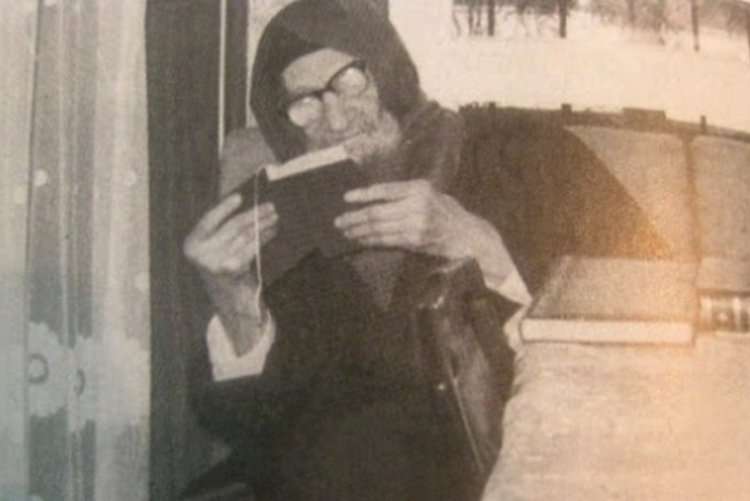The Black Panther Who Became a 'Double' of Baba Sali: Who Are You, R' Amram Cohen?
Meet the 'double' of Baba Sali: He immigrated from Morocco, lived in Jaffa, founded the Black Panthers movement, and now resides in Safed helping the needy. So how did thousands become convinced he was an apparition of Baba Sali?
 Amram Cohen today and in his youth
Amram Cohen today and in his youthIt all began during the intermediate days of Passover, when a rumor spread like wildfire: Rabbi Yisrael Abuhatzeira, of blessed memory, known as Baba Sali, appeared on the eve of the festival at the tomb of the sage Rabbi Yehuda Bar Elai.
As is the nature of rumors that spread on social media, there was quickly a tremendous excitement when the story surfaced in its entirety: It turned out that two young men arrived at the tomb located on the road linking Ein Zeitim to Safed. They encountered an elderly man sitting alone reciting Psalms. When the two observed the man, he looked exactly like Baba Sali to them. They asked for a blessing and were privileged to receive one, even photographing themselves at this touching moment.
These were young men who were born long after the passing of Baba Sali, yet they showed the pictures they took to older people who had known the holy kabbalist in his life, and they excitedly said it was indeed Baba Sali. They asserted that later, when they showed the photos to Rabbi Baruch Abuhatzeira, Baba Sali's son, he glanced at them and said it seemed to him it was indeed his father.
The excitement, as mentioned, was great and crossed sectors. No one could help but recall the many wonders Baba Sali performed during his lifetime and get excited at the thought that he might have appeared. But shortly thereafter the great disappointment came—it was revealed that it was not Baba Sali, but Rabbi Amram Cohen, a righteous Jew residing in Safed. He does indeed bear a striking resemblance to him and frequently visits the graves of the righteous to pray with devotion.
Black Panther
Since the story was published, we've made considerable efforts at 'Hidabroot' to locate Rabbi Amram Cohen and hear the story directly from him. We wanted to understand how such confusion arose and what its implications were. After much effort and numerous contacts, we succeeded in sitting with him for a fascinating conversation.
"No, I wasn't offended by this story, why should I be?" he immediately reassures us. "I even laughed and was amused; I enjoyed the compliment. I resemble Baba Sali? That is a great honor."
People claim that you yourself have a fascinating life story. Is that true?
"A fascinating life story?" Our conversational partner smiles into his beard, and after a brief hesitation, decides to reveal his story to us: "I was born in Morocco in the Hebrew year 5708 (1948) and immigrated to Israel with my family in 5716 (1956). I was eight years old, and my family was initially settled in shanties in Kiryat Shmona. It wasn't easy for us at the time materially, it was a period of austerity and we had very little to eat. Economically, life was very difficult. My father was an elderly man and found it hard to integrate into the agricultural work offered to him. But mostly, there was a great spiritual difficulty. In Morocco, we were very religious, living in the same neighborhood with all of our paternal family, going to the synagogue and praying every day. When we arrived in Israel, everything ended because the school I attended in Kiryat Shmona taught only Zionist content in the manner of 'We Have Come to the Land,' without a trace of tradition.
"It's important to understand," R' Amram wishes to emphasize, "when the Jews from the East came to Israel, they had 'innocent faith.' They believed in God and in all the people around them. They didn't think anyone would deceive or harm them. This led to the fact that despite coming from a Torah-observant family, the education I received in my childhood was completely the opposite. I was a small child and thought this was reality and how things should be.
"Later, my father got a loan and managed to buy a one-and-a-half-room apartment in Jaffa. We lived there—ten souls in a small room, with Arab neighbors, in houses abandoned on the eve of the War of Independence. I grew up in dire poverty and without any connection to religion and tradition. When I was fifteen, my father passed away, and I went to work in the Carmel Market.
"When I got to the army," he notes, "my eyes suddenly opened. I saw people around me who had grown up under different conditions, not in poverty and neglect like me. I started to understand that the state had basically rejected us, causing people everywhere we went to look at us as second-class citizens, people who were not settled. This created bitterness within my soul and led me to join others like me, and together we founded the 'Black Panthers' movement—a movement that naturally arose among people like us, emerging from poor neighborhoods, with much bitterness and anger."
When you look back, do you think the movement was justified?
"Of course, as a believing and observant Jew, when I look back, I know everything was done with divine providence and that the conditions in which I grew up were the best for me. But then, during those days, we genuinely felt we were doing something very important. We also had great achievements—the Black Panthers movement managed to awaken global public opinion, and people began to look at us differently. Until then, the attitude towards Sephardic Jews was as if we had come from Morocco with no culture and without roots, and suddenly we managed to influence public opinion. Suddenly we could speak up and prove ourselves; for us, that was a big deal."
Back to the Land
Just as the movement arose, it also subsided, and very quickly, R' Amram realized that he needed to find work in a field that would allow him to earn a living. "I found a friend in Tel Aviv who taught me building work; I began working in the field and was quite successful at it. After a year and a half, I became a subcontractor, worked in Eilat, and then, like many Jews, I started to feel emptiness and reached a point where I began seeking meaning in life. The feeling was that I needed to travel to search for my truth and identity. I have a brother who lived in Australia at the time, and I decided to go visit him. It was exactly when local elections were being held there, and through my brother, I got Australian citizenship. I settled in Australia, opened a business, and worked there for six years."
R' Amram worked, earned, lived well, but felt in his heart that this wasn't what he was searching for. "I regularly watched videos about an island called 'Fiji' near Australia. It is a secluded island with dark-skinned natives, friendly and as simple as can be. How much I wanted to move there, sit with them peacefully, and forget about the outside world... One day, I found myself simply arriving at Fiji. I discovered a truly magical island. I searched for a secluded grassy spot near the beach, spread out a mat and began to play the guitar. I played and played, feeling how I connected to something internal, my soul. At that time, I wasn't familiar with pictures of the sages from Morocco sitting on mats and delving into the Torah, but that experience of inner connection to the soul brought me back to something I experienced as a child. Suddenly memories flooded back, and I saw myself walking hand-in-hand with my father to the synagogue, in innocence and holiness. I remembered the Shabbat table in Morocco, the shofar blowing on Rosh Hashanah... all the memories surfaced and reminded me of what they wanted me to forget.
"Ultimately, I left Fiji, despite the intoxicating (and deceiving) atmosphere and the simple life there. I traveled to Australia, where I closed my businesses and returned to Israel. With Hashem's help, I married my wife that same year. I was thirty-six then, and we had eight children—seven daughters and a son. The daughters are all married to righteous scholars, and the son fills us with joy and is deeply involved in music. We also perform joint musical performances together quite often."
"It's Just a Compliment"
R' Amram initially lived with his family in Bnei Brak, then moved to Moshav Moreshet, and finally reached Safed. "I founded a charity fund in the city, and I try to help the needy and Torah scholars," he notes. "In my free time, I regularly visit the graves of the righteous, like Rabbi Yonatan Ben Uziel and Rabbi Yehuda Bar Ilai, where I recite chapters of Psalms and feel a spiritual elevation. Last Passover, I went to pray there, and some young men asked if I would bless them. I did so gladly, and from there, this amusing story was born..."
Is this the first time you've heard that you resemble Baba Sali?
"This is definitely not the first time. I've been told this before. Apparently, there really is a resemblance."
 Sina Baba Sali
Sina Baba SaliAnd how did you become aware of your 'new identity'?
"The day after the event, I went to the tomb to pray, and one of the people in charge called me over and showed me what had been written about me. At first, I was really shocked, but then I actually enjoyed the idea. For years, I had a very warm and close connection with Baba Sali; he invited me several times to sing for him, and every time I visited him, he would shake my hand and hold it for a long time until I finished singing. There was even a time he sent a messenger to call me especially from Bnei Brak, to sing for him. So why shouldn't I be happy about the resemblance others see between us? It's an enormous compliment for me."

